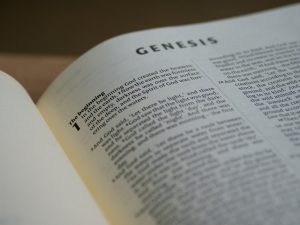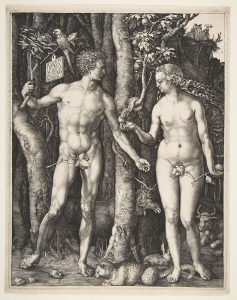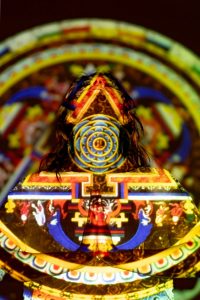Chapter Four – Myth & Meaning
The collaborative construction of mythological meaning.
Andy Gurevich
Genesis is apart from other myths in that it has one god only; he is all-powerful and all-knowing, and doesn’t seem to have the usual human-like failings of gods from other myths.
In a monotheistic belief system, God is generally removed from the people and is perceived as the creator who grants us life but demands pretty strict obedience.

If we proceed with the idea that myth is metaphor, let start with “on the first day”—is this literally a day as we experience it? Since we can’t really know God, how can we know what a “god-day” is? So, is it literal or metaphor?
After God creates the world, animal and plants, he creates Adam and Eve. There are two different accounts of the creation of Adam and Eve in Genesis:
- The first, Chapter 1, lines 26 and 27, has God creating both Adam and Eve in his own image.
- Then in Chapter 2, lines 7 and 21-23, we get the more familiar story of Adam being created from the earth and Eve being created from one of Adam’s ribs. This picture of God giving life to Adam is part of the ceiling of the Sistine Chapel in Vatican City. It is a Renaissance metaphor for creation. (You can see more images of the ceiling on line.)
Bible scholars agree that there were two authors of Genesis, referred to as J-E and P:
- J-E used the name Elohim (lords) and referred to god as Yahweh.
- The P version is believed to have been compiled for use by the priestly class.
The stories merged somewhere around the 6th to 7th centuries BC:
- The older version calls to mind many of the creation myths we have read so far.
- The second version of the creation of Eve from Adam’s rib is unique. Do we take these literally? I think an important question to ask is why such a reversal here? A woman is born from man! (That’s the metaphor).
The next big metaphor is the temptation by the serpent and the loss of the Garden of Eden for Adam and Eve.
Our archetypal serpent plays an interesting role here. The serpent symbolizes many things, from evil (probably best elaborated in Genesis) to rebirth (it sheds its skin).
Keeping this complex symbol in mind, what does the snake actually accomplish? It tempts Eve to eat the fruit from “the tree of the knowledge of good and evil,” despite God’s warning that if they ate of this tree (which is in the center of the garden) they would “surely die.” If this is so, why does Eve eat it and tempt Adam? Notice it didn’t take much to get Adam to go along with this.
In the picture below, we can see the metaphor clearly. Notice that Adam and Eve here have covered themselves before they have eaten of the fruit. Genesis clearly tells us that they ate, then they became ashamed of their nakedness, and then covered themselves. This picture shows the force of the metaphor on the human imagination.

This tree is a great metaphor. Did Adam and Eve have no knowledge of good and evil before they ate? Let’s go beyond the metaphor—what does it mean to have no knowledge of good and evil? This is an important idea to think about. By eating the fruit, they became ashamed of their nakedness (another metaphor) and they hid from God. But God knows all, so, of course, they disobeyed and were served punishment and kicked out of the garden. If god is all-knowing, did he know they would disobey?
There is a theme in myth of the one forbidden thing—Pandora’s box is a good example. It is human nature to be told not to do something yet feel compelled to do it. Have you ever done something forbidden? Don’t we feel a complex of guilt and exhilaration that we did it, even though we knew we shouldn’t? The unspoken lesson we take from this is don’t disobey god, but it also explains why life is so hard. The punishment accounts for the submission of women to men and the hard work we have to do just to be alive.
But it also casts a new light on innocence (no knowledge of good and evil) and awareness of it. Why is knowledge of good and evil such a bad thing? Does it make us god-like in some way? If you remember from the Mayan myth, the gods clouded the vision and reduced the wisdom of their “perfect” creations. What does god say to Adam and Eve when he discovered their disobedience?
This myth, more than telling a story, causes us to ponder very big ideas—the role of knowledge of good and evil—does that make us god-like? It certainly suggests that the fall from the Garden was a loss of a golden or perfect age, maybe like the first yuga in the Hindu cycle. God also makes sure Adam and Eve couldn’t re-enter the garden. What reason does he give? Think about this on top of everything else!
This myth informs millions of people about their nature, our relationship to god, our relationship to each other and the world we live in. If we go beyond the metaphors, we can see the degree to which this myth has meaning for the way we live our lives.
We can do this with all the myths; it’s easier to see with Genesis because many of us are familiar with it. For an online copy of the King James version of Genesis, go to: Genesis-Chapters 1, 2, and 3.
Wanadi
Now to Wanadi. This myth is unique in a few ways. If you read the introduction in the book, you know that the Yekuhana were so isolated that they were never conquered or Christianized. This makes the myth clean of outside influence.
The myth in some ways reflects some Christian beliefs, the idea of a last judgment, the duality of good and evil, to name a few. But it has a quite unique view of reality.

Briefly, this myth is pretty clear cut—it explains the existence of evil, how living beings were created (Was Wanadi smoking just tobacco?) It outlines how man should live his life and what happens at death. It does pose an interesting view of what is real.
But what Wanadi does is answer questions. Genesis, on the other hand, perhaps raises more questions than gives answers. Myth will often do this as well. Forcing us to dig deeper into it, and into ourselves, to uncover its more precious and lasting meaning and relevance.
Readings:
- The opening chapters of Genesis (also linked above)
- History of Venezuelan Myth
- Wanadi, The Creator, Venezuela

